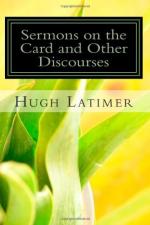and so long to wink for a little lucre; specially if
it be ungodliness, and also seem unto you ungodliness?
These be two things, so oft to seek mere images,
and sometime to visit the relicks of saints.
And yet, as in those there may be much ungodliness
committed, so there may here some superstition be
hid, if that sometime we chance to visit pigs’
bones instead of saints’ relicks, as in time
past it hath chanced, I had almost said, in England.
Then this is too great a blindness, a darkness too
sensible, that these should be so commended in sermons
of some men, and preached to be done after such manner,
as though they could not be evil done; which, notwithstanding,
are such, that neither God nor man commandeth them
to be done. No, rather, men commanded them either
not to be done at all, or else more slowlier and seldomer
to be done, forasmuch as our ancestors made this constitution:
“We command the priests that they oft admonish
the people, and in especial women, that they make
no vows but after long deliberation, consent of their
husbands and counsel of the priest.” The
church of England in time past made this constitution.
What saw they that made this decree? They saw
the intolerable abuses of images. They saw the
perils that might ensue of going on pilgrimage.
They saw the superstitious difference that men made
between image and image. Surely, somewhat they
saw. The constitution is so made, that in manner
it taketh away all such pilgrimages. For it so
plucketh away the abuse of them, that it leaveth either
none or else seldom use of them. For they that
restrain making vows for going of pilgrimage, restrain
also pilgrimage; seeing that for the most part it is
seen that few go on pilgrimage but vow-makers, and
such as by promise bind themselves to go. And
when, I pray you, should a man’s wife go on
pilgrimage, if she went not before she had well debated
the matter with herself, and obtained the consent
of her husband, being a wise man, and were also counselled
by a learned priest so to do? When should she
go far off to these famous images? For this
the common people of England think to be going on
pilgrimage; to go to some dead and notable image out
of town, that is to say, far from their house.
Now if your forefathers made this constitution, and
yet thereby did nothing, the abuses every day more
and more increased, what is left for you to do?
Brethren and fathers, if ye purpose to do any thing,
what should ye sooner do, than to take utterly away
these deceitful and juggling images; or else, if ye
know any other mean to put away abuses, to shew it,
if ye intend to remove abuses? Methink it should
be grateful and pleasant to you to mark the earnest
mind of your forefathers, and to look upon their desire
where they say in their constitution, “We command
you,” and not, “We counsel you.”
How have we been so long a-cold, so long slack in
setting forth so wholesome a precept of the church
of England, where we be so hot in all things that




